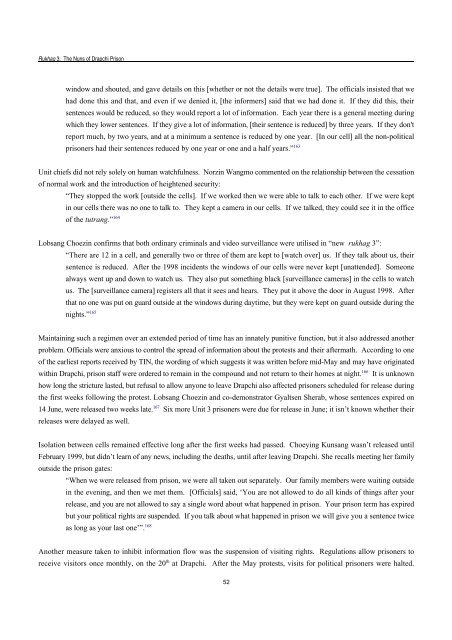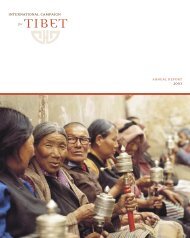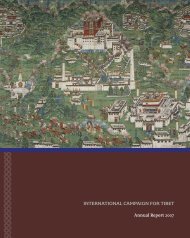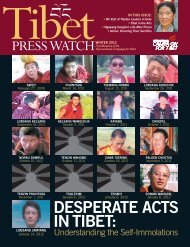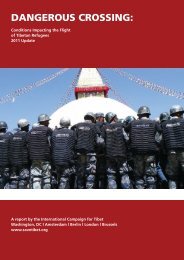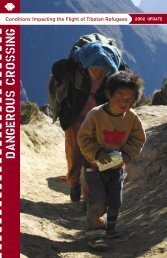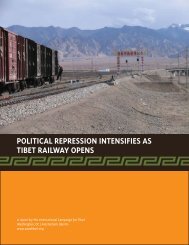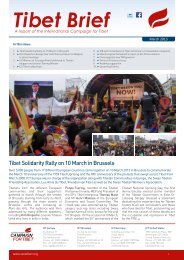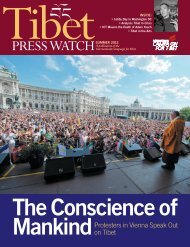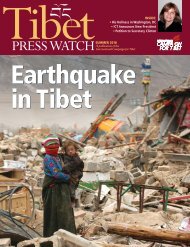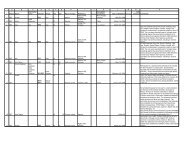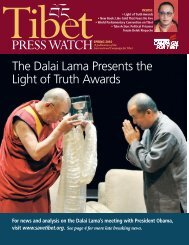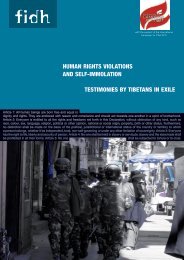Rukhag 3: The Nuns of Drapchi Prisonwindow and shouted, and gave details on this [whe<strong>the</strong>r or not <strong>the</strong> details were true]. The officials insisted that wehad done this and that, and even if we denied it, [<strong>the</strong> in<strong>for</strong>mers] said that we had done it. If <strong>the</strong>y did this, <strong>the</strong>irsentences would be reduced, so <strong>the</strong>y would <strong>report</strong> a lot of in<strong>for</strong>mation. Each year <strong>the</strong>re is a general meeting duringwhich <strong>the</strong>y lower sentences. If <strong>the</strong>y give a lot of in<strong>for</strong>mation, [<strong>the</strong>ir sentence is reduced] by three years. If <strong>the</strong>y don't<strong>report</strong> much, by two years, and at a minimum a sentence is reduced by one year. [In our cell] all <strong>the</strong> non-politicalprisoners had <strong>the</strong>ir sentences reduced by one year or one and a half years.” 163Unit chiefs did not rely solely on human watchfulness. Norzin Wangmo commented on <strong>the</strong> relationship between <strong>the</strong> cessationof normal work and <strong>the</strong> introduction of heightened security:“They stopped <strong>the</strong> work [outside <strong>the</strong> cells]. If we worked <strong>the</strong>n we were able to talk to each o<strong>the</strong>r. If we were keptin our cells <strong>the</strong>re was no one to talk to. They kept a camera in our cells. If we talked, <strong>the</strong>y could see it in <strong>the</strong> officeof <strong>the</strong> tutrang.” 164Lobsang Choezin confirms that both ordinary criminals and video surveillance were utilised in “new rukhag 3”:“There are 12 in a cell, and generally two or three of <strong>the</strong>m are kept to [watch over] us. If <strong>the</strong>y talk about us, <strong>the</strong>irsentence is reduced. After <strong>the</strong> 1998 incidents <strong>the</strong> windows of our cells were never kept [unattended]. Someonealways went up and down to watch us. They also put something black [surveillance cameras] in <strong>the</strong> cells to watchus. The [surveillance camera] registers all that it sees and hears. They put it above <strong>the</strong> door in August 1998. Afterthat no one was put on guard outside at <strong>the</strong> windows during daytime, but <strong>the</strong>y were kept on guard outside during <strong>the</strong>nights.” 165Maintaining such a regimen over an extended period of time has an innately punitive function, but it also addressed ano<strong>the</strong>rproblem. Officials were anxious to control <strong>the</strong> spread of in<strong>for</strong>mation about <strong>the</strong> protests and <strong>the</strong>ir aftermath. According to oneof <strong>the</strong> earliest <strong>report</strong>s received by TIN, <strong>the</strong> wording of which suggests it was written be<strong>for</strong>e mid-May and may have originated166within Drapchi, prison staff were ordered to remain in <strong>the</strong> compound and not return to <strong>the</strong>ir homes at night. It is unknownhow long <strong>the</strong> stricture lasted, but refusal to allow anyone to leave Drapchi also affected prisoners scheduled <strong>for</strong> release during<strong>the</strong> first weeks following <strong>the</strong> protest. Lobsang Choezin and co-demonstrator Gyaltsen Sherab, whose sentences expired on16714 June, were released two weeks late. Six more Unit 3 prisoners were due <strong>for</strong> release in June; it isn’t known whe<strong>the</strong>r <strong>the</strong>irreleases were delayed as well.Isolation between cells remained effective long after <strong>the</strong> first weeks had passed. Choeying Kunsang wasn’t released untilFebruary 1999, but didn’t learn of any news, including <strong>the</strong> deaths, until after leaving Drapchi. She recalls meeting her familyoutside <strong>the</strong> prison gates:“When we were released from prison, we were all taken out separately. Our family members were waiting outsidein <strong>the</strong> evening, and <strong>the</strong>n we met <strong>the</strong>m. [Officials] said, ‘You are not allowed to do all kinds of things after yourrelease, and you are not allowed to say a single word about what happened in prison. Your prison term has expiredbut your political rights are suspended. If you talk about what happened in prison we will give you a sentence twiceas long as your last one’”. 168Ano<strong>the</strong>r measure taken to inhibit in<strong>for</strong>mation flow was <strong>the</strong> suspension of visiting rights. Regulations allow prisoners tothreceive visitors once monthly, on <strong>the</strong> 20 at Drapchi. After <strong>the</strong> May protests, visits <strong>for</strong> political prisoners were halted.52
Unit 3 and <strong>the</strong> Drapchi protests of May 1998Additional security procedures were implemented after that time according to some accounts, though TIN has received <strong>report</strong>sdating to 1996 and 1997 of measures sometimes characterized as post-May 1998. Only immediate family members areentitled to visit a prisoner, erecting a potential barrier against monks and nuns who might wish to visit an incarceratedmember of a shared institution, and increasing <strong>the</strong> isolation of those whose families are far away, deceased, or disinterested. 169One <strong>report</strong>, by a female political prisoner who fled into exile in late 1998 after being released a few years earlier, suggestedthat limited prison visits had resumed as early as July 1998. O<strong>the</strong>r accounts indicate that some prisoners were visited in <strong>the</strong>latter months of 1998, while still o<strong>the</strong>rs point to summer 1999. Resumption of visiting rights appears to have been allowedon a block by block, or cell by cell, basis. That may be confirmed by comments in a <strong>report</strong> which reached TIN in December1998, and which refers to <strong>the</strong> situation in Unit 3:stth“Since <strong>the</strong> incidents took place on <strong>the</strong> 1 and <strong>the</strong> 4 of May, visitors were not allowed to visit [prisoners], and thatlasted until <strong>the</strong> month of July. Then in July, 20 to 30 political prisoners were allowed to have visitors. But someare still not allowed to have visitors.” 170When political prisoners meet visitors, monitoring is strict and time is short. According to Lobsang Choezin, whose releasein June 1998 assures that she refers to visits be<strong>for</strong>e <strong>the</strong> May protests:“When we are visited in prison, <strong>the</strong>y search us twice. They say that we are allowed 50 minute long visits, but wedon't have enough time to drink a cup of tea. They keep two people to watch us at our side, and two at <strong>the</strong> side whereour family stays.” 171Choeying Kunsang believes that <strong>the</strong> viewing window is kept small so that families will not be fully aware of <strong>the</strong> physicalcondition of <strong>the</strong>ir imprisoned relatives. Illustrating her point, she describes a visit from her fa<strong>the</strong>r after she had undergoneabdominal surgery:“ I had an operation on my appendix when I was still in prison. At that time our families were only able to see usthrough a small window with a hole big enough to pass a cup. They were only able to see your face. During <strong>the</strong> visitI had to be supported by two people in order to walk. My fa<strong>the</strong>r came to meet me. He didn't notice that <strong>the</strong>re wassomeone on each side of me because you can only see a face through <strong>the</strong> window.” 172Ngawang Sangdrol may have been among <strong>the</strong> last to have her visiting rights reinstated, in June 1999. According to ChoeyingGyaltsen, she learned that her fa<strong>the</strong>r, Namgyal Tashi, <strong>the</strong>n 64, had been released from Drapchi on 14 June upon completingan eight year sentence. One of her relatives brought <strong>the</strong> news on visitor’s day. Choeying Gyaltsen’s release followedthDrapchi’s regular visiting date, <strong>the</strong> 20 , by ten days. The language of <strong>the</strong> account implies that <strong>the</strong>y were still sharing a cellwhen <strong>the</strong> news arrived. 17353
- Page 4 and 5:
Tibet Information NetworkTibet Info
- Page 8 and 9:
Table of Contents1. Introduction ..
- Page 10 and 11:
Image 15: Gyabdrag Nunnery, in the
- Page 12: Rukhag 3: The Nuns of Drapchi Priso
- Page 15 and 16: Female political prisoners at Drapc
- Page 17 and 18: Female political prisoners at Drapc
- Page 19 and 20: Female political prisoners at Drapc
- Page 21 and 22: Female political prisoners at Drapc
- Page 23 and 24: Female political prisoners at Drapc
- Page 25 and 26: Female political prisoners at Drapc
- Page 27 and 28: Female political prisoners at Drapc
- Page 29 and 30: Female political prisoners at Drapc
- Page 31 and 32: Female political prisoners at Drapc
- Page 33 and 34: Female political prisoners at Drapc
- Page 35 and 36: Female political prisoners at Drapc
- Page 37 and 38: Unit 3 and the Drapchi protests of
- Page 39 and 40: Unit 3 and the Drapchi protests of
- Page 41 and 42: Unit 3 and the Drapchi protests of
- Page 43 and 44: Unit 3 and the Drapchi protests of
- Page 45 and 46: Unit 3 and the Drapchi protests of
- Page 47 and 48: Unit 3 and the Drapchi protests of
- Page 49 and 50: Unit 3 and the Drapchi protests of
- Page 51 and 52: Unit 3 and the Drapchi protests of
- Page 53 and 54: Unit 3 and the Drapchi protests of
- Page 55 and 56: Unit 3 and the Drapchi protests of
- Page 57 and 58: Unit 3 and the Drapchi protests of
- Page 59 and 60: Unit 3 and the Drapchi protests of
- Page 61: Unit 3 and the Drapchi protests of
- Page 65 and 66: Unit 3 and the Drapchi protests of
- Page 67 and 68: Unit 3 and the Drapchi protests of
- Page 69 and 70: Conclusion4. ConclusionThe women no
- Page 71 and 72: Appendices5. AppendicesPrisoner lis
- Page 73 and 74: Appendices500Tibetan political pris
- Page 75 and 76: List 2: Drapchi Prison: Unit 3 nuns
- Page 77 and 78: TIN# status code name lay name det.
- Page 79 and 80: List 4: Female political prisoners
- Page 81 and 82: TIN # status code name lay name det
- Page 83 and 84: TIN# status code name lay name det.
- Page 85 and 86: TIN # status code name lay name det
- Page 87 and 88: TIN # status code name lay name det
- Page 89 and 90: List 8c: Male Tibetan political pri
- Page 91 and 92: List 10: Female political prisoners
- Page 93 and 94: 4 495-0442 REL Ngawang Tenzin Yangd
- Page 95 and 96: 95-0074 REL Tsultrim Choedron Tseri
- Page 97 and 98: EndnotesPrefecture, to the west of
- Page 99 and 100: Endnotes40. TIN Doc 399 names the d
- Page 101 and 102: Endnotes75. TIN Doc 39976. TIN Doc
- Page 103 and 104: EndnotesNgawang Sungrab was taken t
- Page 105 and 106: Endnotes159. TIN Doc 1(sd). Sonam T
- Page 107 and 108: Images6. ImagesA. Nuns and nunnerie
- Page 109 and 110: ImagesExtended sentences, currently
- Page 111 and 112: ImagesImage 13: Chubsang Nunnery, o
- Page 113 and 114:
ImagesImage 15: Gyabdrag Nunnery, i
- Page 115 and 116:
ImagesImage 16b: Mechungri Nunnery,
- Page 117 and 118:
ImagesImage 18: Shar Bumpa Nunnery,
- Page 119 and 120:
ImagesB. Drapchi PrisonImage 20: Dr
- Page 121 and 122:
ImagesImage 21: Drapchi Prison, lat
- Page 123 and 124:
ImagesImage 23: Drapchi Prison, are
- Page 125 and 126:
ImagesImage 25: Drapchi Prison, are
- Page 127 and 128:
ImagesImage 27: Drapchi Prison, are
- Page 129 and 130:
ImagesImage 29: Drapchi Prison, are
- Page 131 and 132:
ImagesImage 30: Lhasa Prison (forme
- Page 133 and 134:
ImagesImage 32: new prison in Sangy
- Page 135 and 136:
ImagesImage 34: Trisam Re-education
- Page 137:
127Images


